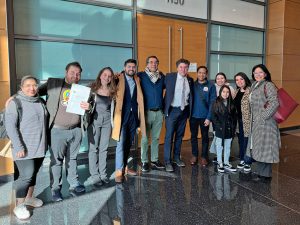This is a fact that I’ve heard a lot of opposition to since starting Learning to Transform, but it is something that I absolutely live by.
Let me start off by giving you the backstory.
When I first started this organization, I wanted to get some feedback on our efforts from colleagues. And one particular comment stuck with me.
“All those training activities seem nice… but we have outcomes to achieve”.
I’ve definitely seen a lot of people not take leadership training seriously, but few have said it to me so plainly. I always appreciate honesty, but I completely disagreed with their perspective.

So here’s what leaders need to understand:
Interactive = Effective
Many people have this spectrum in their heads. On one side, they have boring, rigid, unidirectional meetings that get things done.
And on the other side, they have fun, whimsical, participatory activities just for playtime and relationship-building.
But popular education has taught us that this absolutely is not the case.
In fact, in some ways, it’s the complete opposite. Because when it comes to facilitation and training workshops – interactive styles are far more effective.
- People are more bought in as they’ve been involved in setting the content
- People stay more engaged during the session
- People are more likely to apply what they learn afterwards
So despite the fact that all the research points to participatory events being far more effective – why does this perspective of “nice little activities” still exist?
plainly. I always appreciate honesty, but I completely disagreed with their perspective.

The participatory approach
Could it be that leaders and practitioners of the participatory approach are simply unconcerned with outcomes and instead they just want to do fun activities?
Maybe, but I doubt it.
These are the 3 biggest reasons why I think the mainstream perspective causes people to think that a participatory approach isn’t as effective.
Our meetings don’t consist of conveying information
First, corporate culture has taught us that meetings should be unilateral situations. One person stands in the front with a graph and everyone else sits at a table, silently nodding their heads.
But a participatory approach doesn’t quite work like that. Instead of focusing on conveying information, we focus on gathering it. Our trainings have people on an even playing field, supporting each other and finding solutions together.
We take the value-based argument
This point can cause some friction between changemakers and organizations that only look for quick solutions.
Most of the time, our movement is looking to give organizations the chance to do the right thing, rather than the most economically effective one.
As social change leaders, we’re interested in moving the world towards taking a value-based decision. And unfortunately, leadership doesn’t always see how that aligns with their short-term organizational goals.
Over the long-term, having new leaders is critical for sustainability.
We haven’t popularized it
The name can be misleading. Popular education isn’t “popular” in the sense of “well-known” or “common”. Instead, we’re referring to it as “of the people”.
And this type of liberatory education unfortunately isn’t very well known to most people. A lot of the time, we end up partnering with groups that are already sympathetic to our cause, rather than reaching out to others who could benefit but haven’t heard the term before.
That just means that we end up preaching to the choir instead of growing the cause.

It’s more than just “nice”
This is one of the biggest reasons why we started Learning to Transform in the first place. We want to be able to equip trainers with the tools and strategies to become better leaders and continue growing.
It’s absolutely an uphill journey. As trainers, we have a lot of work ahead of us. From teaching trainers how to be more effective to convincing leaders that yes, this is a more effective approach – there’s a lot that needs to be done.
I know my colleague from the story above isn’t the only person who associates interactive with “nice”. We’ve got a lot of work to make popular education actually popular.
But let me know your thoughts in the comments below –
Why do you think this fact is so widely misunderstood?





